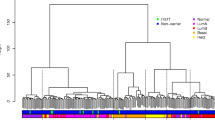Abstract
A single nucleotide polymorphism (SNP309T>G) in the intronic promoter of MDM2 was recently found to accelerate carcinogenesis in early-onset cancer cases. This cancer acceleration presumably was due to increased SP1 binding, resulting in enhanced MDM2 transcriptional activation by estrogens. We evaluated MDM2 SNP309 in 343 familial breast cancer cases with known mutation status for CHEK2 1100delC, BRCA1 and BRCA2. Cancer acceleration was indeed observed in early-onset familial breast cancer cases (diagnosed ≤ 51 years), with 16% of cases carrying the MDM2 SNP309 GG genotype as compared to 4% of late-onset cases (P = 0.029). The cancer acceleration was even more pronounced in the non-mutant familial breast cancer cases, with 17% of early-onset cases carrying MDM2 SNP309 GG as compared to 2% of late-onset cases (n = 214; P = 0.015). There was no evidence for an influence of estrogen signaling in the cancer acceleration by MDM2 SNP309, as there were no differences in the prevalence of MDM2 SNP309 GG among CHEK2 1100delC and BRCA2 mutant cases (with 90% ER-positive cancers) or BRCA1 mutant cases (10% ER-positive cancers). Nor did we observe differences in MDM2 SNP309 frequencies among 75 familial breast cancer cases of our cohort with known ER status. Overall, our data suggest that MDM2 SNP309 accelerates familial breast carcinogenesis, but that this acceleration is not influenced by estrogen signaling.

Similar content being viewed by others
References
Bond GL, Hu W, Bond EE, Robins H, Lutzker SG, Arva NC, Bargonetti J, Bartel F, Taubert H, Wuerl P et al (2004) A single nucleotide polymorphism in the MDM2 promoter attenuates the p53 tumor suppressor pathway and accelerates tumor formation in humans. Cell 119(5):591–602
Vogelstein B, Lane D, Levine AJ (2000): Surfing the p53 network. Nature 408(6810):307–310
Bond GL, Hirshfield KM, Kirchhoff T, Alexe G, Bond EE, Robins H, Bartel F, Taubert H, Wuerl P, Hait W et al (2006) MDM2 SNP309 accelerates tumor formation in a gender-specific and hormone-dependent manner. Cancer Res 66(10):5104–5110
Bond GL, Menin C, Bertorelle R, Alhorpuro P, Aaltonen LA, Levine AJ (2006) MDM2 SNP309 Accelerates colorectal tumour formation in women. J Med Genet
Meijers-Heijboer H, van den Ouweland A, Klijn J, Wasielewski M, de Snoo A, Oldenburg R, Hollestelle A, Houben M, Crepin E, van Veghel-Plandsoen M et al (2002) Low-penetrance susceptibility to breast cancer due to CHEK2(*)1100delC in noncarriers of BRCA1 or BRCA2 mutations. Nat Genet 31(1):55–59
Meijers-Heijboer H, Wijnen J, Vasen H, Wasielewski M, Wagner A, Hollestelle A, Elstrodt F, van den Bos R, de Snoo A, Fat GT et al (2003) The CHEK2 1100delC mutation identifies families with a hereditary breast and colorectal cancer phenotype. Am J Hum Genet 72(5):1308–1314
de Bock GH, Schutte M, Krol-Warmerdam EM, Seynaeve C, Blom J, Brekelmans CT, Meijers-Heijboer H, van Asperen CJ, Cornelisse CJ, Devilee P et al (2004) Tumour characteristics and prognosis of breast cancer patients carrying the germline CHEK2*1100delC variant. J Med Genet 41(10):731–735
Lakhani SR, Van De Vijver MJ, Jacquemier J, Anderson TJ, Osin PP, McGuffog L, Easton DF (2002) The pathology of familial breast cancer: predictive value of immunohistochemical markers estrogen receptor, progesterone receptor, HER-2, and p53 in patients with mutations in BRCA1 and BRCA2. J Clin Oncol 20(9):2310–2318
Verhoog LC, Brekelmans CT, Seynaeve C, van den Bosch LM, Dahmen G, van Geel AN, Tilanus-Linthorst MM, Bartels CC, Wagner A, van den Ouweland A et al (1998) Survival and tumour characteristics of breast-cancer patients with germline mutations of BRCA1. Lancet 351(9099):316–321
van de Wetering M, Barker N, Harkes IC, van der Heyden M, Dijk NJ, Hollestelle A, Klijn JG, Clevers H, Schutte M (2001) Mutant E-cadherin breast cancer cells do not display constitutive Wnt signaling. Cancer Res 61(1):278–284
Elstrodt F, Hollestelle A, Nagel JH, Gorin M, Wasielewski M, van den Ouweland A, Merajver SD, Ethier SP, Schutte M (2006) BRCA1 Mutation Analysis of 41 Human Breast Cancer Cell Lines Reveals Three New Deleterious Mutants. Cancer Res 66(1):41–45
Houlston RS, Peto J (2004) The search for low-penetrance cancer susceptibility alleles. Oncogene 23(38):6471–6476
Acknowledgements
Funding was provided by KWF Dutch Cancer Society
Author information
Authors and Affiliations
Corresponding author
Rights and permissions
About this article
Cite this article
Wasielewski, M., Nagel, J.H.A., Brekelmans, C. et al. MDM2 SNP309 accelerates familial breast carcinogenesis independently of estrogen signaling. Breast Cancer Res Treat 104, 153–157 (2007). https://doi.org/10.1007/s10549-006-9407-5
Received:
Accepted:
Published:
Issue Date:
DOI: https://doi.org/10.1007/s10549-006-9407-5




